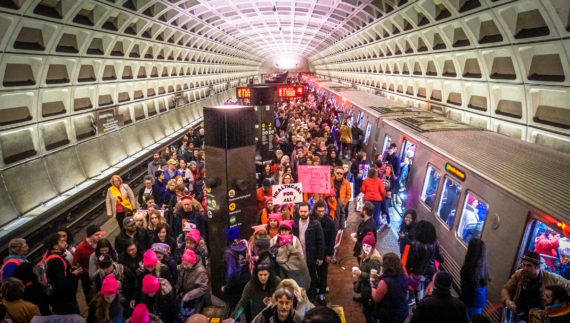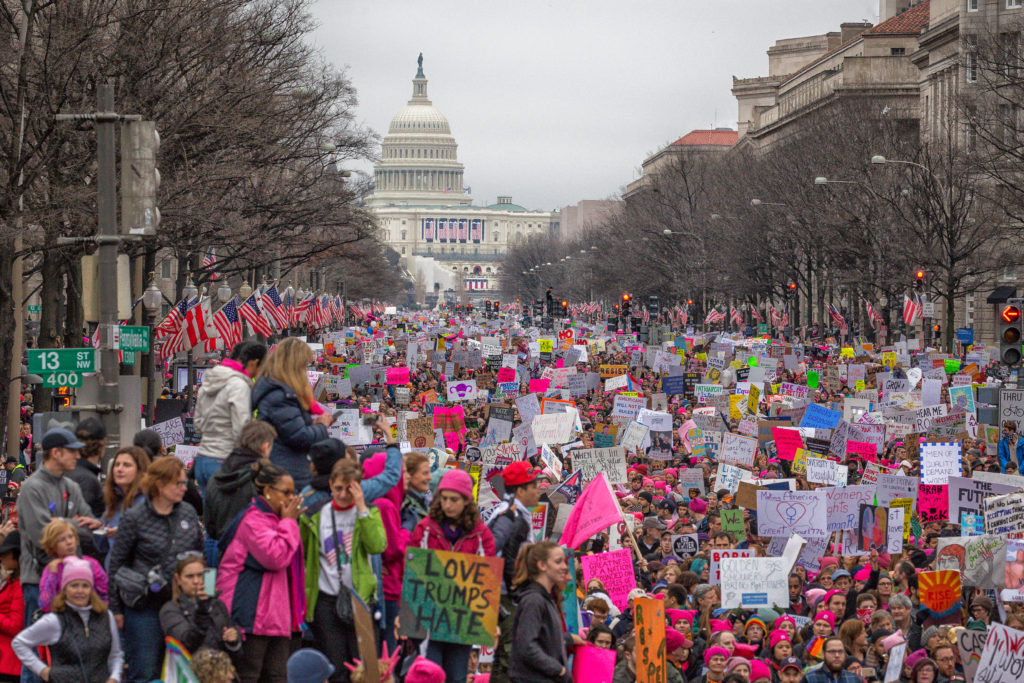Self control and knitted pink hats
January 21, 2017 started early for me. Shortly after a foggy 2 a.m., I boarded a bus outside the Ithaca Wegman’s grocery store and with a few hundred other women, traveled to Washington, D.C.
We arrived well after dawn. The area around the city was jammed with people—most of them women—carrying handmade signs and wearing emblematic knitted pink “pussy” hats with ears, a reference to the new president’s vulgarity.
With my friend and her mom, I took the Metro to L’Enfant Plaza, where it took us nearly three hours to get from the train across the platform, up the stairs, to the fresh air. Three hours.

I was sick, spending some of the wait doubled with abdominal pain. I was scared. I dislike being underground, and it occurred to me that one foul move—a shot, a stabbing, a panic—would result in disaster.
But nothing bad happened. Women held their signs and their backpacks and their friend’s hands and together we slowly eased out of the tunnel.
A while after surfacing, as I strained to hear Scarlett Johansson speak on a platform a football field away, my dad texted me: “Happy Saturday! We just took a walk. How are you?” “Great,” I texted back, or something like that. I was afraid to tell my parents that I was in the middle of a mass protest. I didn’t want them to worry. And at the time, I didn’t want to reveal to them I was drifting left.
Packed into the capital with nearly half a million other women, I did not know at the time why I was there, adding my body to the press of bodies to stand in defiance of “not my president” and the “American carnage” he had decried (or was he summoning it?) during his inauguration the day before.
It was a decision I grew unto during the next four years. Now I know why I was there.

On January 6, 2021, an angry mob broke into the U.S. Capitol building at the bidding of the president. Someone quipped on Twitter, “When the election didn’t go their way, they smashed stuff and killed people. We knitted pink hats.”
A day after the January 6, 2021 uprising, I stumbled across a hashtag Trump supporters were using to publicize and organize their trips to Washington, D.C. Among notices about camping spots and bus reservations, there were many posts co-opting the Christian evangelical language I grew up with: “Put on the armor of God,” “I have fought the good fight.” There was even someone hoping for a “second coming…” referring to Donald Trump, not Christ.
A news photo of the uprising showed a poster: “Jesus Saves.” These people (most of them men, it’s worth noting) were using scripture and Christian clichés to defend their destructive actions and anger.
Another phrase from the Bible rose up in my mind against them. Self-control.
Galatians 5:22-23: “But the fruit of the spirit is love, joy, peace, patience, kindness, goodness, faithfulness, gentleness—and self-control; against such things there is no law.”
Self-control: we women showed incredible self-control in Washington, D.C. on January 21, 2017. Getting out of that subway station took all morning, but no one got hurt or even raised her voice. Going anywhere took forever all day, plus massive amounts of communication with groups, but the crowds were peaceful. Food was either BYO or nothing until our bus reached Pennsylvania that night.
At one point, my two companions and I were packed so tightly in a crowd that was an extension of the throng on the Mall, we could not move. Not one step one way or the other under an open sky. But there was no violence: not one arrest was made in D.C., Chicago, L.A., New York, or Seattle, where a combined 2 million people marched. We were there to be there and by being there, to say something.
Self-control is an outward sign of inner spiritual good.
The day after the women’s march, I admitted to my parents on the phone where I’d been. I expected them to be upset. Instead, they were proud of me. They applauded my decision and expressed their support for the marches. My mom even talked about knitting pussy hats.
This was the beginning of a four-year positive dialogue between me and my parents about politics and faith. My father, especially, spoke out against Trump for four years among his conservative circles.
Yesterday, January 20, 2021, Joe Biden became the 46th President of the United States, and Kamala Harris became the Vice President—the first woman, and first Black American and first South Asian American all at once. I’d say this is a long-term result of our self-control four years ago.
In her Inaugural Poem, Amanda Gorman quoted Micah 4:4: “everyone shall sit under their own vine and fig tree, and no one shall make them afraid.”
Scripture: not a cliché or an abuse, but real, honest, glorious quoting of an Old Testament prophet. Using truth for the sake of truth. We will not be afraid.
You do well in expressing the stark contrast between two views of the world, and the country, at this point in time. May Americans, and Christians, chose rightly.
Thank you, Dad : ) It’s taken years to see clearly, but now I think I can. I’m glad we talked on the phone after the march.